Unit 2 English around the world Writing 课件(19张PPT)
文档属性
| 名称 | Unit 2 English around the world Writing 课件(19张PPT) | 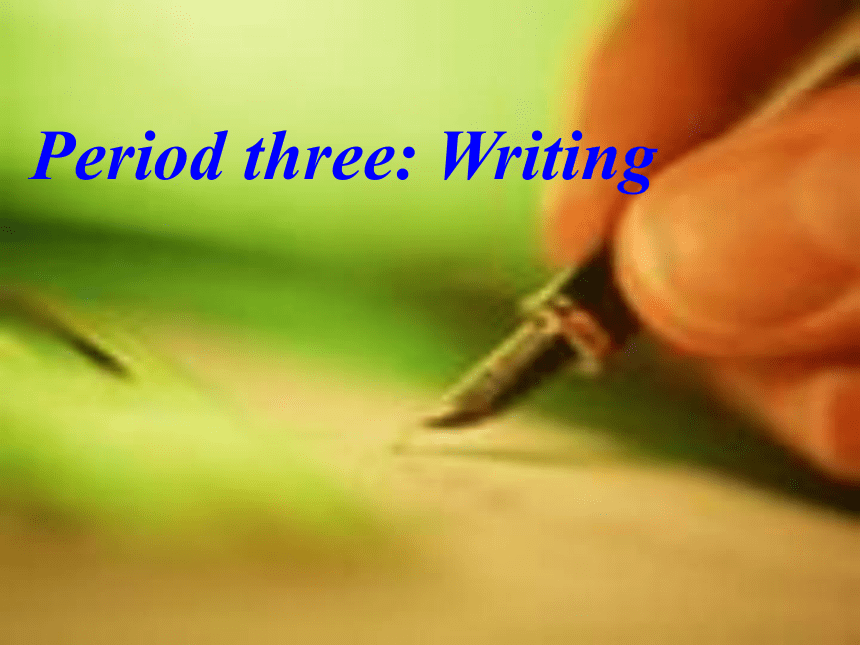 | |
| 格式 | zip | ||
| 文件大小 | 434.5KB | ||
| 资源类型 | 教案 | ||
| 版本资源 | 人教版(新课程标准) | ||
| 科目 | 英语 | ||
| 更新时间 | 2019-12-15 09:02:57 | ||
图片预览

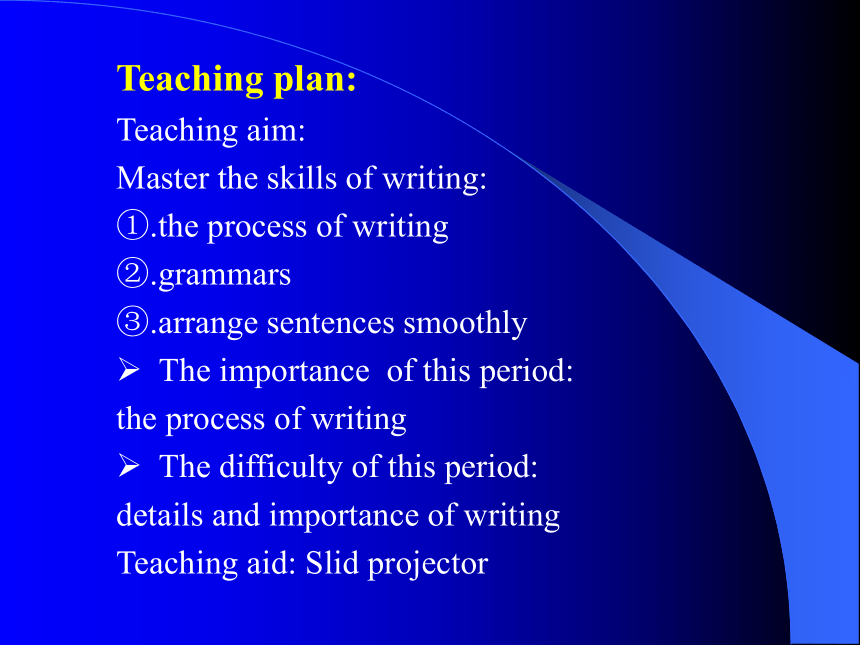
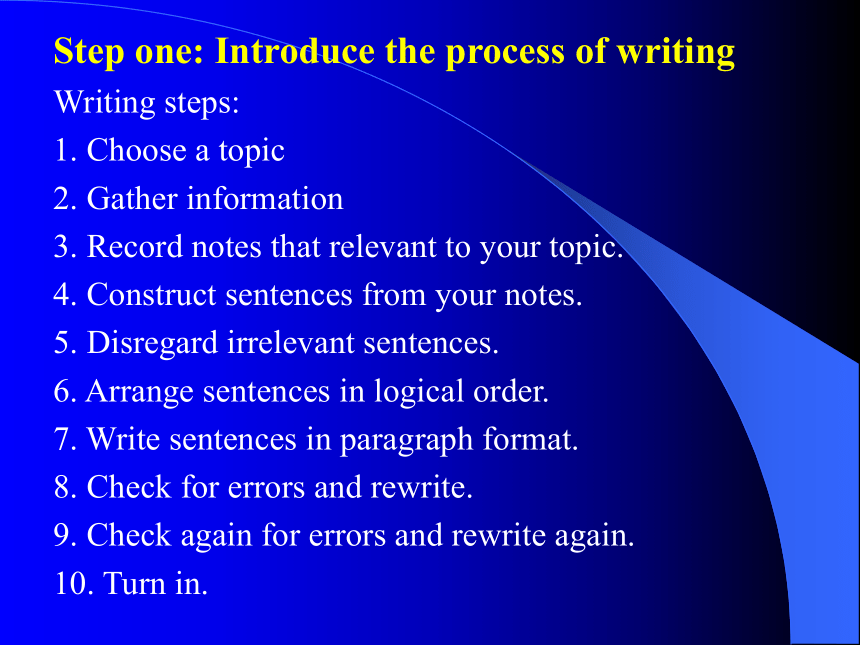
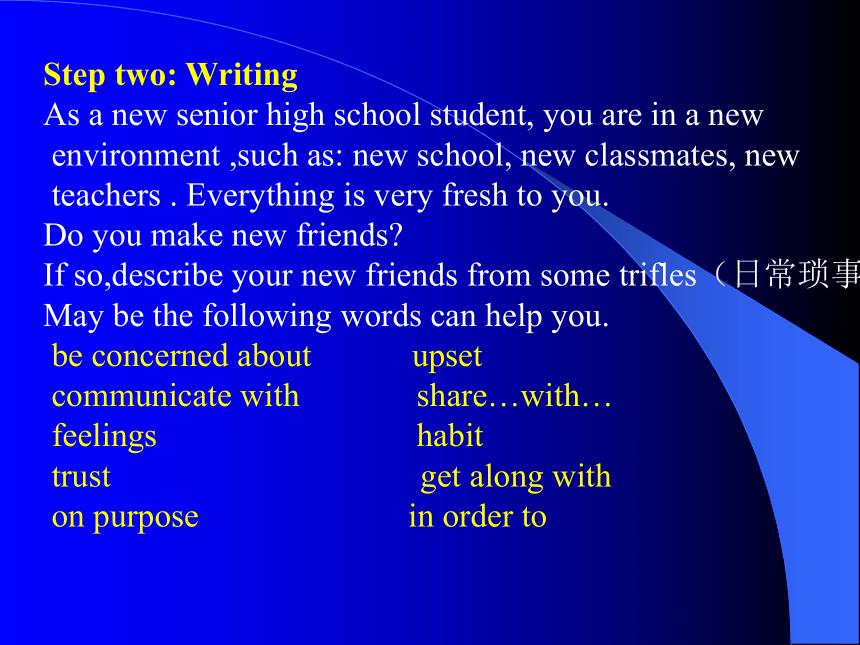
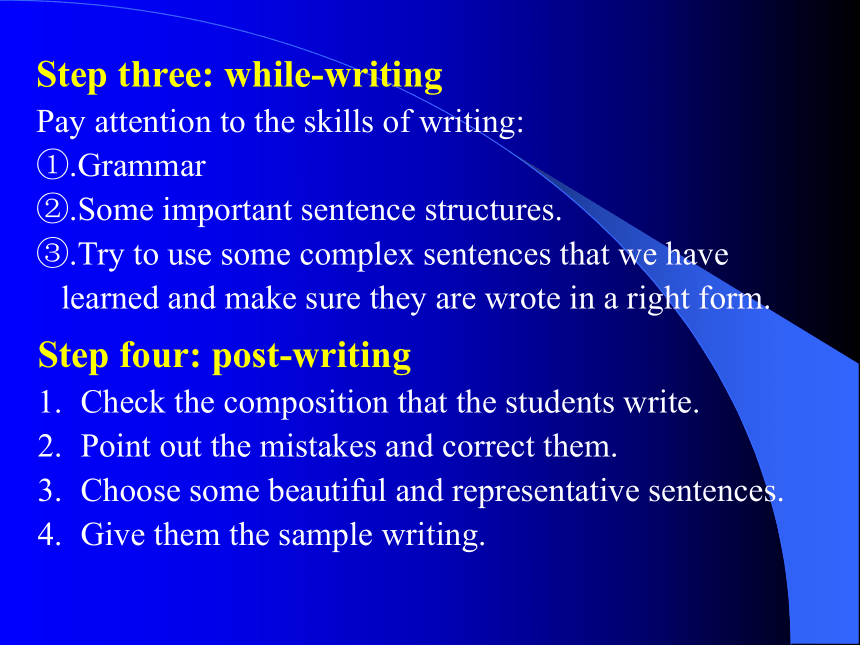
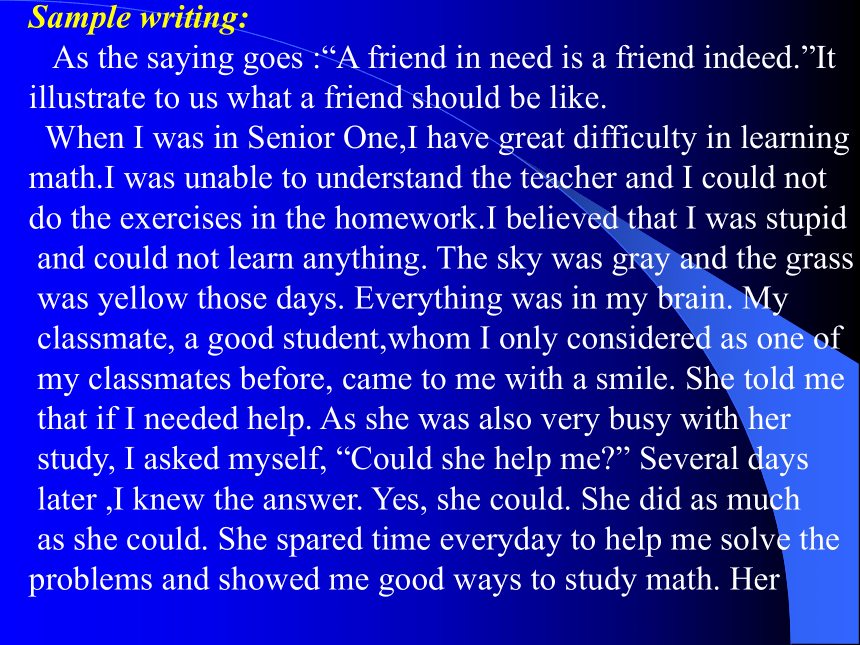
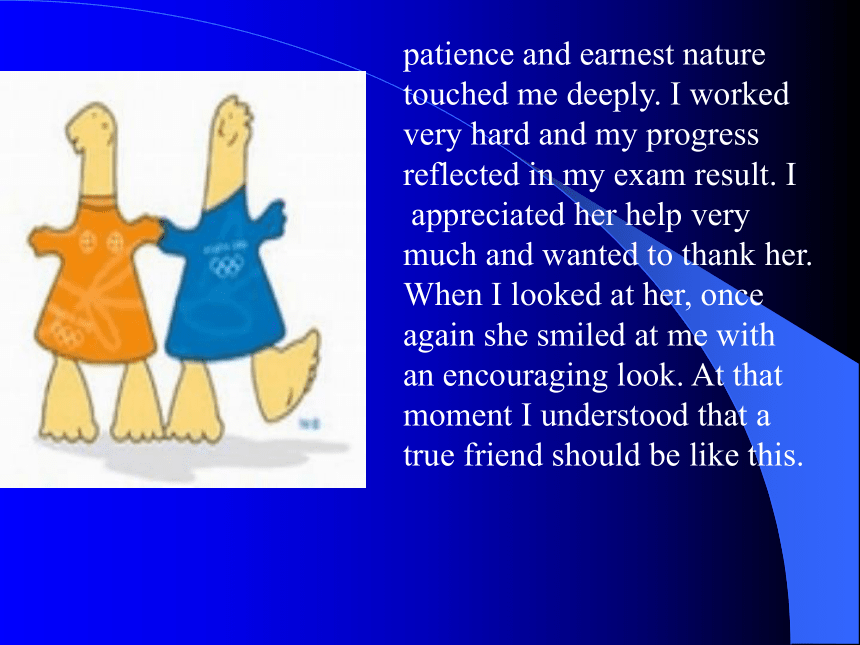
文档简介
(共20张PPT)
Period three: Writing
Teaching plan:
Teaching aim:
Master the skills of writing:
①.the process of writing
②.grammars
③.arrange sentences smoothly
The importance of this period:
the process of writing
The difficulty of this period:
details and importance of writing
Teaching aid: Slid projector
Step one: Introduce the process of writing
Writing steps:
1. Choose a topic
2. Gather information
3. Record notes that relevant to your topic.
4. Construct sentences from your notes.
5. Disregard irrelevant sentences.
6. Arrange sentences in logical order.
7. Write sentences in paragraph format.
8. Check for errors and rewrite.
9. Check again for errors and rewrite again.
10. Turn in.
Step two: Writing
As a new senior high school student, you are in a new
environment ,such as: new school, new classmates, new
teachers . Everything is very fresh to you.
Do you make new friends?
If so,describe your new friends from some trifles(日常琐事)。
May be the following words can help you.
be concerned about upset
communicate with share…with…
feelings habit
trust get along with
on purpose in order to
Step three: while-writing
Pay attention to the skills of writing:
①.Grammar
②.Some important sentence structures.
③.Try to use some complex sentences that we have
learned and make sure they are wrote in a right form.
Step four: post-writing
Check the composition that the students write.
Point out the mistakes and correct them.
Choose some beautiful and representative sentences.
Give them the sample writing.
Sample writing:
As the saying goes :“A friend in need is a friend indeed.”It
illustrate to us what a friend should be like.
When I was in Senior One,I have great difficulty in learning
math.I was unable to understand the teacher and I could not
do the exercises in the homework.I believed that I was stupid
and could not learn anything. The sky was gray and the grass
was yellow those days. Everything was in my brain. My
classmate, a good student,whom I only considered as one of
my classmates before, came to me with a smile. She told me
that if I needed help. As she was also very busy with her
study, I asked myself, “Could she help me?” Several days
later ,I knew the answer. Yes, she could. She did as much
as she could. She spared time everyday to help me solve the
problems and showed me good ways to study math. Her
patience and earnest nature touched me deeply. I worked
very hard and my progress reflected in my exam result. I
appreciated her help very much and wanted to thank her.
When I looked at her, once again she smiled at me with
an encouraging look. At that moment I understood that a
true friend should be like this.
Step five: Homework
Write the composition into their exercise books.
Pay attention to their writing.
Period four: grammar
Teaching aim:
The purpose of this period is to master the usage of
grammar“Direct speech and Indirect speech”.
The importance of this period :
Direct speech and indirect speech
The difficulty of this period:
The use of Direct speech and indirect speech
Teaching aid: slid projector
Teaching method: ①. Instructive method
②. speculative method
③. observating method
Step one: Review
Check some new words and expressions .
Turn to page 41. Do the exercises one and two together.
Step two: Analyze the grammar.
Statement ①.person
②.tenses
③.pronouns, adverbials of time and place,
verb
2.Imperative sentence: Pay attention to infinitive
3. Question: ①一般疑问句:pay attention to introductoriness (引导词)
②特殊疑问句:When change indirect speech , we should use primary introductoriness.
Step three: Analyze the usage of the grammar
1.Statement:
1):the change of person
He said, “I like it very much.”
→ He said that he liked it very much.
2):the change of tense
If the verb “say/tell”is in the past tense, you usually
change the verb tenses into Indirect speech.While
doing this exercise, you should pay attention to the
verb tenses.
①present tense past tense
②present progressive tense past progressive tense
③present perfect tense past perfect tense
For example:
He said, “I love you forever.”
→He said that he loved me forever.
2. He said, “I’m using the knife.”
→He said that he was using the knife.
3. She said, “I have not heard from him since May.”
→She said that she had not heard from him since May.
4. He said, “I saw her in the street.”
→He said that he had seen her in the street.
5. She said , “I’ll do it after class.”
→She said that she would do it after class.
④.past tense → past perfect
⑤.future tense → past future tense
⑥.past perfect tense → past perfect tense
3).the change of pronouns, adverbials of time and place When we change direct speech into indirect speech: this→ that these → those now→ then ago→ before/earlier today → that day yesterday → the day before tomorrow→ the next/following day come→ go here → there
For example:
He said, “I hate the examination.”
→He said that he hated the examination.
2. He said, “These books are mine.”
→He said that those books were mine.
3. He said, “It is nine o’clock now.”
→He said that it was nine o’clock then.
4. He said, “I haven’t seen her today.”
→He said that he hadn’t seen her that day.
5. She said, “I went there yesterday.”
→She said that she had gone there the day before.
3. Turn to page 5. Let’s do the exercises.
Step four: Homework
Write exercise 2 (page 5)
into your exercise book.
Pay attention to your handwriting.
Thank you!
Period three: Writing
Teaching plan:
Teaching aim:
Master the skills of writing:
①.the process of writing
②.grammars
③.arrange sentences smoothly
The importance of this period:
the process of writing
The difficulty of this period:
details and importance of writing
Teaching aid: Slid projector
Step one: Introduce the process of writing
Writing steps:
1. Choose a topic
2. Gather information
3. Record notes that relevant to your topic.
4. Construct sentences from your notes.
5. Disregard irrelevant sentences.
6. Arrange sentences in logical order.
7. Write sentences in paragraph format.
8. Check for errors and rewrite.
9. Check again for errors and rewrite again.
10. Turn in.
Step two: Writing
As a new senior high school student, you are in a new
environment ,such as: new school, new classmates, new
teachers . Everything is very fresh to you.
Do you make new friends?
If so,describe your new friends from some trifles(日常琐事)。
May be the following words can help you.
be concerned about upset
communicate with share…with…
feelings habit
trust get along with
on purpose in order to
Step three: while-writing
Pay attention to the skills of writing:
①.Grammar
②.Some important sentence structures.
③.Try to use some complex sentences that we have
learned and make sure they are wrote in a right form.
Step four: post-writing
Check the composition that the students write.
Point out the mistakes and correct them.
Choose some beautiful and representative sentences.
Give them the sample writing.
Sample writing:
As the saying goes :“A friend in need is a friend indeed.”It
illustrate to us what a friend should be like.
When I was in Senior One,I have great difficulty in learning
math.I was unable to understand the teacher and I could not
do the exercises in the homework.I believed that I was stupid
and could not learn anything. The sky was gray and the grass
was yellow those days. Everything was in my brain. My
classmate, a good student,whom I only considered as one of
my classmates before, came to me with a smile. She told me
that if I needed help. As she was also very busy with her
study, I asked myself, “Could she help me?” Several days
later ,I knew the answer. Yes, she could. She did as much
as she could. She spared time everyday to help me solve the
problems and showed me good ways to study math. Her
patience and earnest nature touched me deeply. I worked
very hard and my progress reflected in my exam result. I
appreciated her help very much and wanted to thank her.
When I looked at her, once again she smiled at me with
an encouraging look. At that moment I understood that a
true friend should be like this.
Step five: Homework
Write the composition into their exercise books.
Pay attention to their writing.
Period four: grammar
Teaching aim:
The purpose of this period is to master the usage of
grammar“Direct speech and Indirect speech”.
The importance of this period :
Direct speech and indirect speech
The difficulty of this period:
The use of Direct speech and indirect speech
Teaching aid: slid projector
Teaching method: ①. Instructive method
②. speculative method
③. observating method
Step one: Review
Check some new words and expressions .
Turn to page 41. Do the exercises one and two together.
Step two: Analyze the grammar.
Statement ①.person
②.tenses
③.pronouns, adverbials of time and place,
verb
2.Imperative sentence: Pay attention to infinitive
3. Question: ①一般疑问句:pay attention to introductoriness (引导词)
②特殊疑问句:When change indirect speech , we should use primary introductoriness.
Step three: Analyze the usage of the grammar
1.Statement:
1):the change of person
He said, “I like it very much.”
→ He said that he liked it very much.
2):the change of tense
If the verb “say/tell”is in the past tense, you usually
change the verb tenses into Indirect speech.While
doing this exercise, you should pay attention to the
verb tenses.
①present tense past tense
②present progressive tense past progressive tense
③present perfect tense past perfect tense
For example:
He said, “I love you forever.”
→He said that he loved me forever.
2. He said, “I’m using the knife.”
→He said that he was using the knife.
3. She said, “I have not heard from him since May.”
→She said that she had not heard from him since May.
4. He said, “I saw her in the street.”
→He said that he had seen her in the street.
5. She said , “I’ll do it after class.”
→She said that she would do it after class.
④.past tense → past perfect
⑤.future tense → past future tense
⑥.past perfect tense → past perfect tense
3).the change of pronouns, adverbials of time and place When we change direct speech into indirect speech: this→ that these → those now→ then ago→ before/earlier today → that day yesterday → the day before tomorrow→ the next/following day come→ go here → there
For example:
He said, “I hate the examination.”
→He said that he hated the examination.
2. He said, “These books are mine.”
→He said that those books were mine.
3. He said, “It is nine o’clock now.”
→He said that it was nine o’clock then.
4. He said, “I haven’t seen her today.”
→He said that he hadn’t seen her that day.
5. She said, “I went there yesterday.”
→She said that she had gone there the day before.
3. Turn to page 5. Let’s do the exercises.
Step four: Homework
Write exercise 2 (page 5)
into your exercise book.
Pay attention to your handwriting.
Thank you!
